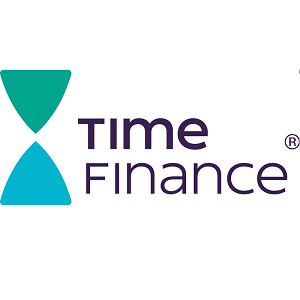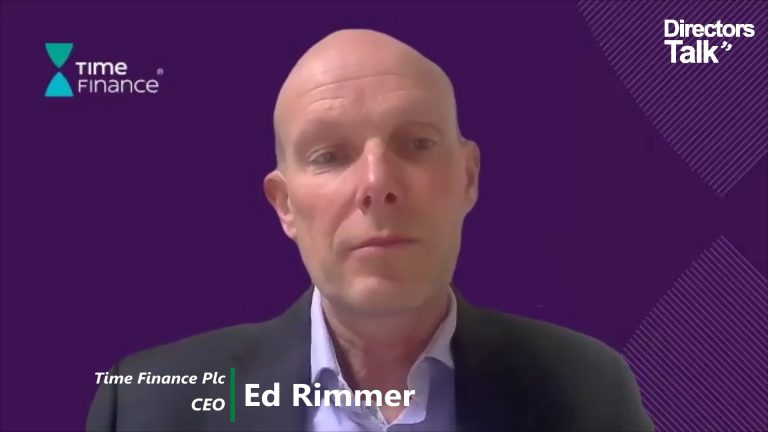Time Finance plc Chief Executive Officer Ed Rimmer caught up with DirectorsTalk for an exclusive interview to discuss what drove the positive performance, challenging economic conditions, and the longer term aspirations for the business.
Q1: Ed, what are the key things that have contributed to the positive performance this year for the business?
A1: Well, I think there’s a number of things. The first one is undoubtedly market related, since the Covid days and the market pick up, post the government funding schemes, we’ve seen small businesses needing to access finance more, and that’s definitely helped us.
I think our own strategy is really what’s contributed to the growth and the success of our numbers. We restructured the business post the 1pm days, the business was previously called 1pm, we rebranded as Time Finance at the end of 2020 and since then we’ve really made a concerted effort to reposition the business.
So, previously it was a mix of brokerages and own book lenders, we’ve moved away from the brokerage elements and focused very much on the own lending side of the business to build our own balance sheet. It was also a mix of consumer and business to business lending and we’ve moved very much into the business to business arena.
The business has been slimmed down as well, we’ve now got four offices, we previously had seven and we’ve reduced the number of products as well so very much focused on invoice discounting as well as asset finance, and those two products now make up 75% of our lending.
So, I think the simplification of the business, the move towards focusing on business to business lending and growing our own book lending has made the business more manageable. That’s definitely contributed to the growth and the focus that we’ve been able to provide.
Q2: How are the challenging economic conditions facing small businesses impacting the group?
A2: It’s definitely impacting us, that’s for sure. Things have definitely changed in the last 12 months, interest rates have obviously gone up and there’s been supply chain challenges really since Covid, they have eased somewhat in certain areas, but they still exist. And obviously, the well-publicised inflationary pressures that businesses have been under with energy costs increasing significantly.
So all those issues have had a knock on impact to small businesses and I think that’s led to the change in market dynamics, which is that they’ve needed to access third party finance more, that’s given us opportunities and threats.
So, it’s created opportunities from the market, so people needing to borrow more money, but also from within the market so other bigger lenders, they change credit policies, they exit certain sectors and that creates opportunities for ourselves. So, we’ve taken advantage of some of those opportunities that have come our way.
But on the flip side of that, it’s definitely increased the collections activity and the risk and recovery side of our business, and that’s really key. Lending money is one thing, but getting it back is the other and we really need to focus on getting the balance right.
So, putting the effort into getting the right people and processes into the recovery side of the business has definitely changed and the activity in that area is increase. That doesn’t mean to say that it’s all bad, it just means to say that we need to be prepared for the more difficult times that businesses are facing.
Q3: You talked earlier about repositioning the business. You’re now heading into the final year of a current four-year plan, which started first of June, what are the longer term aspirations for Time Finance?
A3: Yes, that’s right. We put a post-Covid plan in place when I came back into the business in June ’21 so we’re just coming to the end of the third year of that plan.
We’ve started talking about the planning for what lies ahead at the end of our current cycle, which is through to May next year and I think it’s very much further growth, that’s the essence of what we’re trying to achieve.
We do think there’s opportunities for alternative lenders like ourselves who are agile, flexible, very focused on service that small businesses appreciate. So, it’s very much focused around continuing to grow the business, and some of the growth will come from new products that will be adjacent to what we currently do.
We’re not looking to go into completely different areas, but we do think there’s opportunities with adjacent products to what we currently do and I think there will be opportunities to acquire, again, some adjacent books to our hard assets and our invoice finance divisions that are really core to what we do.
The 10 years or so pre-Covid, the economy was more benign, those opportunities didn’t really come into the market. I think with the way that credit conditions are working now, there will be opportunities for those bolt on acquisitions to help us grow inorganically as well as organically.
The final thing is with that growth, we have to focus on efficiencies as well so building the business in a controlled way so that we can see an increase in our income and our profitability, but a disproportionate increase in our costs. So, seeing our cost income come down from where it currently is as we grow the business more efficiently and that is definitely a focus on utilising IT and systems better and process management more effectively as well.
So that there are, I think, the key things that lie ahead for us.









































